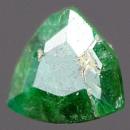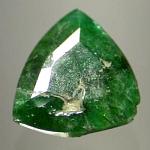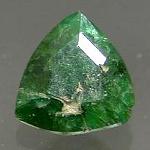|
ClassicGems.net |
|
|
 |
|
Cuprian Adamite (a variety of Adamite) |
|
|
Discovery date unknown; IMA status: Not Valid (a variety of Adamite) |
|||
|
|
|
Chemistry |
|
|
|
|
|
(Zn,Cu)2AsO4OH |
|
|
|
Zinc Copper Arsenate Hydroxide |
|
|
|
|
More Information |
|
|
|
|
|
|
Cuprian
Adamite
is a variety of Adamite. |
|
Synonyms: |
Cu-Adamite,
Cuproadamite |
|
Color: |
Bright to
dark Green; faint tints of Green in transmitted light
|
|
Luminescence: |
Not Fluorescent |
|
Type Locality: |
Originally
reported from Cap Garonne Mine, Pradet, Var, Provence-Alpes-Côte d'Azur, France
|
|
|
Mindat.org
(Cuprian Adamite) |
|
View mineral photos: |
|
|
|
|
|
Cuprian Adamite, also known as Cuproadamite, is a green variety of Adamite containing some copper that was originally reported from Cap Garonne Mine, Pradet, Var, Provence-Alpes-Côte d'Azur, France. This copper gives Cuprian Adamite its distinct pale to dark green color. Adamite is one of the best fluorescent minerals but Cuprian Adamite does not fluoresce because the copper kills the fluorescence. This is not a foolproof test as some Adamites that contain little or no copper do not fluoresce either. Nearly all other properties of Cuprian Adamite are identical to Adamite except typical color, density and fluorescence. Cuprian Adamite is an intermediate mineral between Adamite and Olivinite. There is a pink to purple variety of Adamite called Manganoan Adamite that is colored by its manganese content. Cuprian Adamite was named for its copper content and its relationship with Adamite. Adamite was named in honor of Gilbert-Joseph Adam (1795–1881), French mineralogist, who supplied the first specimens. Distribution: In Australia at Broken Hill, Yancowinna County, New South Wales. In Chile at Veta Negra Mine, Pampa Larga district, Tierra Amarilla, Copiapó Province, Atacama Region. In China at Pinggui District, Hezhou Prefecture, Guangxi Zhuang Autonomous Region. In France at the Clara and Tistoulet Mines, Padern, Tuchan, Aude, Languedoc-Roussillon. In Greece at Lavrion District, Attikí (Attica; Attika) Prefecture. In Italy at the Vignola Mine, Vignola-Falesina, Valsugana, Trento Province, Trentino-Alto Adige. In Mexico at the Ojuela Mine, Mapimí, Mun. de Mapimí, Durango. In Namibia at the Tsumeb Mine, Tsumeb, Otjikoto Region. In Russia at Dal'negorsk, Kavalerovo Mining District, Primorskiy Kray, Far-Eastern Region. In the USA at Mohawk Hill, Pactolus, Clark Mountain District, Clark Mts (Clark Mountain Range), San Bernardino County, California; San Rafael Mine, Quartz Mountain camp, Lodi District, Nye County, Nevada; and at Gold Hill, Gold Hill District, Deep Creek Mts, Tooele County, Utah. |
|
|
Cuprian Adamite gems for sale:
|
|||||||||||||||||||||||||||

